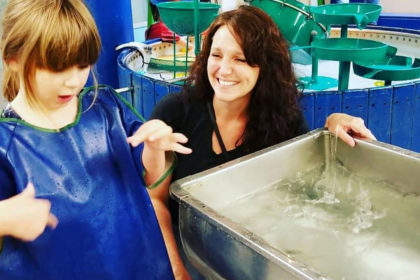As I pen down this blog post, my emotions ebb and flow between a heavy sadness and a flicker of hope. The subject at hand is not merely personal but resonates with the countless parents navigating the intricate landscape of special needs care giving in Washington State. I extend my sincere gratitude to those who have lent their time and ears to discuss the pressing concerns surrounding in-home caregiver training, especially for parents of children with special needs.
For the past four years, the State of Washington Department of Disabilities Administration has been a lifeline for my family. My lovely daughter, Brooklyn, my ten-year-old mostly non-verbal angel, has been approved for monthly caregiver hours. These hours, are a respite for this dedicated mother,not just a luxury but a lifeline—a requirement for me to work and recharge.
In the past four years, we have experienced a rarity—a consistent caregiver for 2.5 years, a period we cherished and valued deeply. However, the joy derived from this program has been marred by the last ten months of searching for a new caregiver. A seemingly insurmountable task to find someone available and willing to undergo the mandatory two-week training. Most candidates are juggling school or other employment commitments, making this request a logistical challenge.
However, in the midst of this struggle, a glimmer of hope has emerged! Washington State House Representatives have taken notice and initiated efforts to rectify some of the prevailing issues. While this is indeed a positive development, there is still much work to be done to ensure that the caregiver program becomes more accessible and responsive to the needs of families like mine.
The Current State of Caregiver Training Program:
The passing of Bill 1694, is now allowing family members to become certified caregivers and is reducing the training hours significantly, from 70 hours to under 12. This is a welcome development, however, the challenges persist for those of us without available family support. I myself have found that the 2 ½ week full-time training commitment is often untenable for candidates applying for the position. Moreover, the disconnect between the training content and the practical realities of caring for a child with special needs necessitates parents to provide extensive hands-on training, essentially rendering the initial training a waste of time and money.
I’m not speaking from a parents perspective only, but also as a caregiver. I myself went through the state training program this spring and found that 99.5% was devoted to Elderly Care and a whopping 4 pages of the 1100+ mentioned the Autism Spectrum. The training was about 30 hours online and 40 in person. After the training it is required for me to take the test in person. Demonstrating that I am able to clean my clients dentures properly or assist them in repositioning. The craziest thing is that my client is 10 years old and has developmental challenges and I don’t intend on working the elderly community. So yet again…why are we requiring this? Below you will find my detailed notes on the inadequacies of the current training curriculum along with the letter to our State Representatives expressing our concerns.Please remember that this is not just my story; it’s a call to action for collective change. The challenges faced by special needs parents in Washington State are not isolated incidents; they are systemic issues that demand systemic solutions. It’s high time for a comprehensive review and revamping of the caregiver training program, making it more inclusive, relevant, and accommodating to the unique needs of children with disabilities.
Together, we can influence positive change and create a more supportive and effective special needs caregiver program in Washington State. Let’s turn our sadness into motivation, our hope into determination, and work collaboratively towards a brighter and more accessible future for families like ours.
Your thoughts, questions, and concerns are not just welcome—they are essential in shaping this conversation. Let’s ensure that the voices of parents and caregivers are not only heard but become the driving force!
For the past four years, the State of Washington Department of Disabilities Administration has been a lifeline for my family. My lovely daughter, Brooklyn, my ten-year-old mostly non-verbal angel, has been approved for monthly caregiver hours. These hours, are a respite for this dedicated mother,not just a luxury but a lifeline—a requirement for me to work and recharge.
In the past four years, we have experienced a rarity—a consistent caregiver for 2.5 years, a period we cherished and valued deeply. However, the joy derived from this program has been marred by the last ten months of searching for a new caregiver. A seemingly insurmountable task to find someone available and willing to undergo the mandatory two-week training. Most candidates are juggling school or other employment commitments, making this request a logistical challenge.
However, in the midst of this struggle, a glimmer of hope has emerged! Washington State House Representatives have taken notice and initiated efforts to rectify some of the prevailing issues. While this is indeed a positive development, there is still much work to be done to ensure that the caregiver program becomes more accessible and responsive to the needs of families like mine.
The Current State of Caregiver Training Program:
The passing of Bill 1694, is now allowing family members to become certified caregivers and is reducing the training hours significantly, from 70 hours to under 12. This is a welcome development, however, the challenges persist for those of us without available family support. I myself have found that the 2 ½ week full-time training commitment is often untenable for candidates applying for the position. Moreover, the disconnect between the training content and the practical realities of caring for a child with special needs necessitates parents to provide extensive hands-on training, essentially rendering the initial training a waste of time and money.
I’m not speaking from a parents perspective only, but also as a caregiver. I myself went through the state training program this spring and found that 99.5% was devoted to Elderly Care and a whopping 4 pages of the 1100+ mentioned the Autism Spectrum. The training was about 30 hours online and 40 in person. After the training it is required for me to take the test in person. Demonstrating that I am able to clean my clients dentures properly or assist them in repositioning. The craziest thing is that my client is 10 years old and has developmental challenges and I don’t intend on working the elderly community. So yet again…why are we requiring this? Below you will find my detailed notes on the inadequacies of the current training curriculum along with the letter to our State Representatives expressing our concerns.Please remember that this is not just my story; it’s a call to action for collective change. The challenges faced by special needs parents in Washington State are not isolated incidents; they are systemic issues that demand systemic solutions. It’s high time for a comprehensive review and revamping of the caregiver training program, making it more inclusive, relevant, and accommodating to the unique needs of children with disabilities.
Together, we can influence positive change and create a more supportive and effective special needs caregiver program in Washington State. Let’s turn our sadness into motivation, our hope into determination, and work collaboratively towards a brighter and more accessible future for families like ours.
Your thoughts, questions, and concerns are not just welcome—they are essential in shaping this conversation. Let’s ensure that the voices of parents and caregivers are not only heard but become the driving force!





